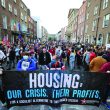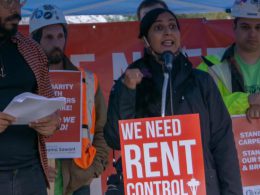By Ann Katrin Orr
The hated Tory government was kicked out of power on Thursday. There was much satisfaction in watching some of the people, who for 14 years have presided over ever worsening crises for ordinary people, and who partied while many couldn’t sit next to dying loved ones during the pandemic, lost their seats. Jacob-Rees Mogg lost his seat. Sunak has resigned as Tory leader. Lis Truss was slow clapped onto the stage for the announcement that she had lost her seat.Of course, all of them will be fine and will likely walk into very well-paid jobs in the corporate world very soon, a world to which they are intimately connected to.
But celebrating a long overdue defeat of the Tories is not accompanied by any enthusiasm for Keir Starmer. He won this election, boasting about the transformation he has achieved in the Labour party and heralding great success. Yet Labour’s vote share is only 1.9% above the 2019 figure – when Labour’s results were described as catastrophic. In fact, in both general elections for which Corbyn led the Labour party, they received a higher number of votes; 13,887,918 in 2017 and 10,269,051 in 2019. In this election they received 9,686,329 votes. These figures, together with the very low turnout, illustrate the lack of enthusiasm for Labour. Success evidently is relative. The deeply skewed nature of a first-past-the-post system was clearly on display. Labour received just over one-third of the vote but two-thirds of the seats. Channel 4’s news political editor, Gary Gibbon, aptly described their result as a “loveless landslide”. These results puncture the myth put forward by the Blairite, right-wing Labour leadership, which now has an iron grip over the party, that shifting to the right and abandoning the left-wing policies championed by Corbyn resulted in increased support.
No enthusiasm for Starmer’s ‘Tory light’
Getting rid of the Tories is a positive, but if we are to be successful in bringing about real change for working-class people and the oppressed, sitting back and hoping Starmer will prove principled or left-wing is futile. He has made it clear that he stands for maintaining the economic status quo of a broken capitalist system that has meant low productivity, stagnant wages, underfunded public services and falling living standards in Britain. He has dutifully supported the Gaza genocide, supports British imperialism’s foreign policy and shamefully made transphobic comments in the context of a right-wing backlash against this oppressed community. We have to urgently organise and mobilise to fight for real change – whether it is on housing, on opposition to the genocide in Gaza, on funding and safe staffing for the NHS, or trans or migrant rights.
We have to ensure Starmer will quickly face insurmountable pressure – from trade unions and work-place actions to vibrant and strong campaigns of workers and young people in our communities and on the streets.
In Scotland, disillusionment with the SNP after years of them failing to develop a strategy to achieve independence as well as their recent backtracking on issues of climate protection and trans rights is evident. People again voted to kick the Tories out and Labour was the vehicle to achieve that goal. The SNP lost 37 seats in this election and will have only 9 in the next Westminster parliament.Starmer should be under no illusions that he won this election due to the collapse in the Conservative vote – the vast majority of which did not go to Labour but to the more openly right wing Reform UK party led by Nigel Farage. For the first time, Farage is now an elected MP. He will lead a group of five Reform MPs. Their overall vote of 4,117,221 in comparison to the Tory’s 6,827,311 and that they came second in 103 constituencies shows how much damage they have done to the Tories. Important to note is however also that Reform took votes from Labour – around 10% in seats held by the Labour Party. The vast majority (93) of the constituencies in which Reform came second were won by Labour. This election underlines the potential for a further growth of the more-right wing, openly anti-immigrant and reactionary force.
The only way to undercut their support is to articulate and build a clear left alternative. Yet Starmer has already proven he is more likely to adapt to right-wing talking points and seek to make concessions as his statements on refugees and “small boats” illustrated during the campaign. While he comfortably held his seat, his vote share in his own constituency of Holborn and St Pancras declined by 17.4% compared to 2019 – an illustration of the lack of enthusiasm for Starmer.Challenging racism, transphobia and the far right requires a different approach. Outlining a real left and socialist alternative is key.
The election of five candidates who strongly oppose the genocide in Gaza is an illustration if the potential that exists to build an alternative to the left of Labour. Jeremy Corbyn actually increased his majority in Islington North, standing as an independent for the first time after having been purged from the Labour Party under Starmer’s leadership. The Greens also did well, winning a total of four seats (up from one in 2019) and also benefiting from the solidarity with Palestine. The election of MPs who openly back Palestinian liberation underlines how important the issue of Palestine is to many young and working-class voters; this was particularly evident in Muslim communities.
DUP clear losers in Northern Ireland
In Northern Ireland, the story is also predominantly about who lost, with the DUP clearly ahead on that scale. They lost three seats to other parties: to Alliance in Jeffrey Donaldson’s previous constituency of Lagan Valley; to former Health Minister, Robin Swann (UUP) in South Antrim and significantly to Jim Allister of the TUV. He managed to unexpectedly take the North Antrim seat, which had been held for over 50 years, first by Ian Paisley and then by Ian Paisley Jr. Party leader Gavin Robinson successfully defended his seat in East Belfast, which is the reason this is a bad but not a devastating election for the DUP. Sinn Féin have now also taken the largest share of seats in a Westminster election as demographic changes continue to be reflected in elections. But this success is on the basis of a loss of DUP seats as Sinn Fein’s results remain unchanged at seven from the last Westminster election, even though they managed a significant win with former nurses’ union leader Pat Cullen in Fermanagh, South Tyrone. Also in that constituency, Cross-Community Labour Alternative candidate Gerry Cullen received a respectable 624 or 1.2% of the vote share. The SDLP who maintained their two seats (in part thanks to Sinn Féin’s decision to stand aside in South Belfast) and UUP who regained Westminster representation will be happy with the results, while for Alliance the end result is more of a draw as they lost in the head-to-head with the DUP in East Belfast and also Stephen Farry’s seat in North Down to now independent unionist Alex Easton (formerly of the DUP).T
he first past the post system coupled with differences on turnout means that a simple translation from this vote to Stormont or local elections is not possible. However it is evident that this was an important election which particularly illustrated the pressure that exists on the DUP from different sides, especially from those who opposed their return to Stormont as evident in the significant increase of the TUV vote. The impact of this was also seen in how Gregory Campbell only just defended his seat, which was previously considered secure, with 179 votes more than Sinn Féin who came second. The TUV received around 4,300 votes in that constituency.
Build the fightback
There can be no honeymoon for this government. Labour is more susceptible to pressure from below and from outside of parliament which now needs to be built in a serious way. Starmer has made clear that he is no ally of refugees, or queer people or of working-class people generally. Instead he has been competing with Sunak about who is tougher on the “small boats” and openly transphobic. Real change – one which will see action to address the huge and ever growing wealth inequality, the lack of rights and heightened exploitation alongside scapegoating of migrants, the rise in LGBTQ+phobia and also ensuring high level of public services and public housing for all will only come about through campaigns and actions of working-class people ourselves. Crucially, it must be linked with the urgent necessity to build a new multi-racial, multi-gendered movement that breaks with this rotten capitalist system. Building this movement is now more urgent than ever. An important part of this is building a political challenge by and for working-class and young people.
The election of left independents including Corbyn as well as strong votes for others shows there is a space for a bold left alternative. Such alternative must stand against the genocide in Gaza, against racism and the far right and fight for housing and a fully funded NHS and for queer liberation. It must outline the left alternative to the crisis ridden and environmentally destructive capitalist system. While he has refused to seize previous opportunities, Corbyn could still put out an authoritative call for campaigners, activists and trade unionists to come together to build such a political force. A first step would be to organise collectively to put pressure on Starmer to act on the cost of living crisis, to enhance and protect trans rights, to fund the NHS and reverse privatisation to name only a few.
Activists from different campaigns and movements alongside trade union activists come together we have huge power – this power should also be cohered into a new left political organisation – one that can express the demands and desires of active struggles and at the same time be informed and learn from those newly drawn into struggle by the reality of capitalism’s misery, destruction, exploitation and oppression. Drawing these individual struggles together and infusing them with a clear anti-capitalist analysis and programme is essential. On this basis we can see how a fight by a large movement of working-class people against the entire crisis-ridden system and for revolutionary socialist change can be built.












